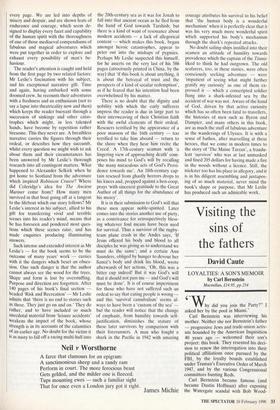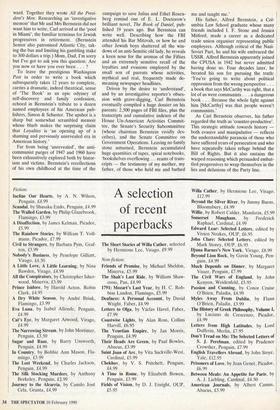Visiting the sins of the fathers
David Caute
LOYALTIES:'A SON'S MEMOIR by Carl Bernstein
Macmillan, £14.95, pp.254
G"
Why did you join the Party?" I asked her by the pool in Miami.' Carl Bernstein was interviewing his mother. Neither she nor Bernstein's father — progressive Jews and trade-union activ- ists hounded by the American Inquisition 40 years ago — welcomed their son's project: this book. They resented his deci- sion to renew the interrogation into their political affiliations once pursued by the FBI, by the loyalty boards established under Truman's Executive Order of March 1947, and by the various Congressional committees hunting Reds.
Carl Bernstein became famous (and became Dustin Hoffman) after exposing the Watergate scandal with Bob Wood-
ward. Together they wrote All the Presi- dent's Men. Researching an 'investigative memoir' that Mr and Mrs Bernstein did not want him to write, Carl arrived at the 'pool in Miami', the familiar terminus for Jewish progressives in retirement. (Bernstein Senior also patronised Atlantic City, tak- ing the bus and limiting his gambling stake to 300 dollars a trip.) Mom, Dad, I'm sorry but I've got to ask you this question: Are you now or have you ever been . . ?
To leave the prestigious Washington Post in order to write a book which subsequently takes 12 years to complete, carries a dramatic, indeed theatrical, sense of 'The Book' as an epic odyssey of self-discovery and family confession, echoed in Bernstein's tribute to a dozen named employees of his American pub- lishers, Simon & Schuster. The upshot is a sharp but somewhat scrambled memoir whose blurb makes the surprising claim that Loyalties is 'an opening up of a shaming and previously unrevealed era in American history.'
Far from being `unrevealed', the anti- communist purges of 1947 and 1960 have been exhaustively explored both by histor- ians and victims. Bernstein's recollections of his oWn childhood at the time of the
campaign to save Julius and Ethel Rosen- berg remind one of E. L. Doctorow's brilliant novel, The Book of Daniel, pub- lished 19 years ago. But Bernstein can write well. Describing how the FBI attended his Bar Mitzvah, or how he and other Jewish boys shattered all the win- dows of an anti-Semitic old lady, he reveals a keen nose for the aromas of the Fifties and an extremely sensitive recall of the loyalties and evasions employed by the small son of parents whose activities, mythical and real, frequently made de- meaning newspaper headlines.
Driven by the desire to 'understand', and by an investigative reporter's obses- sion with grave-digging, Carl Bernstein eventually compiled a huge dossier on his parents: 2,500 pages of FBI files, plus the transcripts and cumulative indexes of the House Un-American Activities Commit- tee, the Senate's Security Subcommittee (whose chairman Bernstein vividly des- cribes), and the Senate Committee on Government Operations. Leaving no family stone unturned, Bernstein accumulated huge quantities of tapes, spiral notebooks,
`bookshelves overflowing reams of trans- cripts - the testimony of my mother, my father, of those who held me and bathed
me and taught me.'
His father, Alfred Bernstein, a Col- umbia Law School graduate whose many friends included I. F. Stone and Jessica Mitford, made a career as a dedicated trade union organiser representing public employees. Although critical of the Nazi- Soviet Pact, he and his wife embraced the USSR. Alfred Bernstein apparently joined the CPUSA in 1942 but never admitted having done so. Four decades later, he berated his son for pursuing the truth: `You're going to write about political oppression from the wrong perspective . . . a book that says McCarthy was right, that a lot of us were communists . . . a dangerous book . . . Because the whole fight against him [McCarthy] was that people weren't communists.'
As Carl Bernstein observes, his father regarded the truth as 'counter-productive'. This strategic attitude towards history both evasive and manipulative - reflects the understandable paranoia of those who have suffered years of persecution and who have repeatedly taken refuge behind the Bill of Rights. But it also sustains the warped reasoning which persuaded embat- tled progressives to wrap themselves in the lies and delusions of the Party line.



















































 Previous page
Previous page